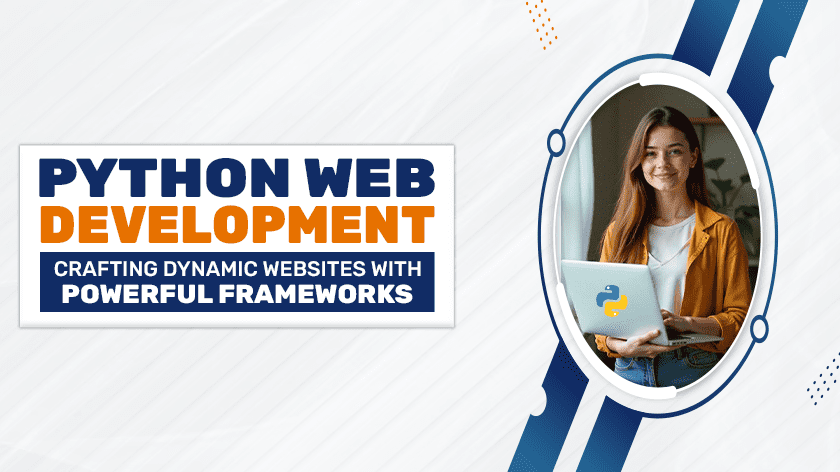The language most commonly employed for web development these days is Python, which powers anything from simple web pages to complex, large-scale systems. Python is popular among developers because of its efficiency, adaptability, and clarity, particularly when building dynamic websites. Robust, scalable, and high-performing frameworks such as Django, Flask, and FastAPI make web application development possible.
Why Choose Python for Web Development?
Python’s simplicity and versatility make it ideal for both beginners and experienced developers. Here’s why Python is a preferred choice for web development:
- Ease of Learning and Use: Python’s syntax is clear and intuitive, which shortens the learning curve and speeds up the development process.
- Large Community Support: Python has an extensive developer community, which means there are plenty of resources, libraries, and tools available.
- Scalability: From small startups to tech giants like Instagram and Pinterest, Python can handle projects of all sizes, providing a reliable foundation for future growth.
- Versatile Libraries and Frameworks: Python’s wide array of frameworks and libraries simplifies everything from back-end logic to front-end design.
Key Python Frameworks for Web Development
Django: One of the most well-liked and complete Python frameworks for web development is Django. It is perfect for large-scale applications because it places a strong emphasis on reusability and the “don’t repeat yourself” philosophy.
- Features: Django is a full-stack framework, meaning it includes everything needed for web development, from ORM (Object-Relational Mapping) and authentication to form processing and URL routing.
- Benefits: With Django, developers can quickly set up a secure, robust application without having to configure many components from scratch. The Django REST Framework further enhances Django for API development.
- Use Case: Ideal for complex applications that require a secure, scalable foundation, such as e-commerce platforms, social media sites, and content management systems.
Flask: Flask is a micro-framework that is portable and offers web developers greater freedom. Without being limited by a larger framework, it allows developers to design unique solutions by granting them the freedom to use the tools and frameworks of their choice.
- Features: Flask is minimalist and modular, making it ideal for applications that need to stay small and focused. It supports extensions, which makes it highly adaptable.
- Benefits: Flask is a great choice for developers who want to start small and add functionalities over time, offering simplicity without sacrificing performance.
- Use Case: Perfect for smaller projects or projects where customization and scalability are key. Many developers choose Flask for APIs, smaller web applications, or microservices.
FastAPI: Using common Python-type hints, FastAPI is a modern, fast (high-performance) web framework for creating APIs using Python 3.6+. It is the perfect option for creating quick, scalable APIs because of its reactive capability.
- Features: FastAPI leverages Python’s typing to provide automatic API documentation, making it easier to develop, test, and deploy APIs.
- Benefits: One of the main benefits of FastAPI is its speed. It can process a lot of requests with little delay because it is made to promote reactive programming.
- Use Case: Best suited for real-time applications, high-performance APIs, and any application where speed and reliability are priorities.
Best Practices for Python Web Development
To ensure successful Python web development, here are some essential best practices to follow:
- Use Virtual Environments: Isolate project dependencies by creating virtual environments to keep your project’s dependencies separate.
- Write Modular Code: Break down code into reusable modules to simplify updates and testing.
- Optimize Database Queries: Use ORM properly and avoid unnecessary queries to ensure fast performance.
- Security First: Secure your application by using Django’s built-in security features or implementing best practices like input validation, user authentication, and CSRF protection.
- Testing and Debugging: Regularly test your application using Python testing frameworks like PyTest or Django’s built-in test suite to catch issues early.
Python Libraries and Tools to Enhance Web Development
- SQLAlchemy: A powerful ORM library that makes it easy to work with databases.
- Jinja2: A templating engine for creating dynamic HTML.
- Celery: A task queue for handling asynchronous tasks and background jobs.
- Gunicorn & Uvicorn: High-performance HTTP servers that work well with Flask, Django, and FastAPI.
Conclusion: Python has become a leader in web development due to its simplicity, versatility, and extensive framework support. From Django’s all-encompassing capabilities to Flask’s flexibility and the performance of FastAPI, Python frameworks empower developers to craft dynamic, scalable websites tailored to any project’s needs. By leveraging Python’s powerful tools, best practices, and growing community, developers can create high-performing web applications that stand out in today’s digital landscape.
Reach out to Xceltec to discuss how our expert team can bring your project to life with the power of Python web development. Let us help you craft a high-performing, scalable solution tailored to your business needs!
 :
https://in.pinterest.com/xceltec0192/
:
https://in.pinterest.com/xceltec0192/












